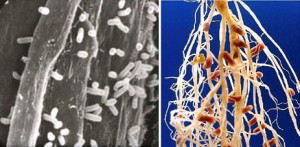Plants Identify Benign Bacteria by Their Exopolysaccharides

Scientists from the Centre for Carbohydrate Recognition and Signalling (CARB) from Denmark and New Zealand and their collaborators from the Centre for Complex Carbohydrate Research in Georgia, USA have recently discovered how legumes recognize and let in favorable bacteria. This study, published in Nature, can have deep significance as the conclusions help understand how other superior eukaryotes deal with infections and discern damaging from advantageous bacteria. The findings will have a positive effect on medical and agricultural research.
Legumes interact with Rhizobia, a type of bacteria that are able to fix atmospheric nitrogen. Nitrogen is an essential, limiting nutrient for plants, which can not fix it from the atmosphere. Symbiosis between both organisms provides nitrogen to the plant – nitrogen that is fixed by the bacteria as ammonia – and grants protection to the bacteria. But little was known about how the plants can select beneficial symbionts.
Bacteria have a wide variety of exopolysaccharides, sugar molecules tethered to the cell wall and exposed to the extracellular space. These molecules have roles in cell-to-cell interactions, immune evasion, pathogenesis, biofilm formation and colonisation of ecological niches. But this finding brings a new function of carbohydrates as signal molecules. Exopolysaccharides can be recognized by plants cell receptors and used for identification of constructive bacteria.
The interdisciplinary approach of the research teams, combining their expertise in microbial genetics, biochemistry and carbohydrate chemistry, allowed the success of the project. An exopolysaccharide receptor gene, Epr3, was identified in the Lotus japonicus genome. Epr3 codes for a membrane receptor that binds the bacterial exopolysaccharides and regulates bacteria entry into the plant.
So far, microbiota colonisation of hosts is not well understood. This finding will surely help unravel the molecular mechanisms of eukaryote-bacteria interactions.
Source: http://mbg.au.dk/en/news-and-events/news-item/artikel/researchers-discover-how-bacteria-sweet-talk-their-way-into-plants/

